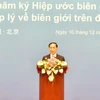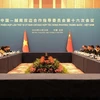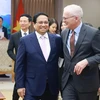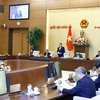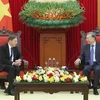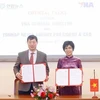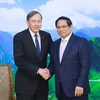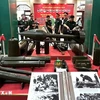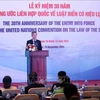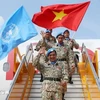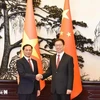The fourth National Party Congress: Reviewing the resistance war against the US imperialists for national salvation, and guiding the nation towards socialism.
With the 1975 Spring General Offensive and Uprising, with the historic Ho Chi Minh Campaign as it peak, under the leadership of the Party, our people made a great victory: completely liberating the South and reunifying the country. Vietnam ’s revolution entered a new stage. For the first time, in a peaceful, independent and unified country, the people from all regions were eager to join in the general election, electing a common National Assembly of the entire nation.
In an enthusiastic and hopeful atmosphere, the fourth National Party Congress took place in Hanoi from December 14-20, 1976. As many as 1,008 delegates representing more than 1.55 million Party members nationwide and 29 international delegations attended the congress.
The congress summed up our people’s anti-US resistance war for national salvation, drew up major lessons covering a wide range of diverse and profound contents, and affirmed the entire nation’s revolutionary path towards socialism. Guidelines and policies throughout this period focused on promoting national reconciliation; conducting socialist reforms; healing the wounds of the war; gradually restoring and developing the economy, society, culture and education; building infrastructure of socialism; strengthening national defence, maintaining political security and social order, and strengthening the Party building work to enhance the Party’s leadership and combating capacity during the new period. The congress decided that speeding up the socialist industrialistion was a key task of the entire period of transition to socialism.
The congress decided to rename the Vietnam Workers’ Party the Communist Party of Vietnam and adopted the Party’s new Statutes. The congress restored the post of General Secretary instead of First Secretary and elected a Central Committee, consisting of 101 official and 32 alternate members. The Political Bureau comprised 14 official and three alternate members. Comrade Le Duan was elected as General Secretary.
The fourth National Party Congress was of extremely important significance: It was the congress of the victory of the national liberation and reunification cause that steered the entire nation in the process of socialist construction.
- The fifth National Party Congress: All for the socialist Fatherland and the people’s happiness.
During the years between the fourth and the fifth National Party Congresses, the Vietnamese revolution shifted to a new stage and the united nation began the construction and protection of a socialist Vietnam . In the light of the fourth National Party Congress’s Resolution, the entire Party, people and army spared no efforts to restore, reform and develop the economy and reaped a broad range of achievements in many fields.
The Resolution adopted at the sixth meeting of the Party Central Committee (fourth tenure) created an impetus for the development of agriculture, forestry, fishery and consumer goods production. Directive 100, which was issued by the Party Central Committee’s Secretariat in October 1981, regarding the products-based payments for groups and labourers in agricultural cooperatives initially created a new momentum in production activities.
The fifth National Party Congress convened in the capital city of Hanoi from March 27-31, 1982. A total of 1,033 delegates representing more than 1.72 million Party members across the country, and 47 international delegations attended the congress.
The congress heard a Political Report of the Party Central Committee and many other important reports. The congress honestly pointed out objective and subjective reasons of the existing difficulties and weaknesses. On that basis, the congress outlined major socio-economic directions, tasks and targets for the 1981-1985 period, and set out two strategic tasks: building socialism and firmly protecting the Fatherland of socialist Vietnam .
The congress adopted the Party’s Statutes (revised) and elected a Central Committee, which included 116 official and 36 alternate members; comrade Le Duan was re-elected as General Secretary by the Central Committee.
After the congress, the economic situation, especially the market and price situation, continued to worsen and real salary kept falling. The 8 th meeting of the Party Central Committee discussed and decided to make one-step reform of price, salary, finance and monetary in order to abolish red tape and subsidy, absolutely shift to socialist-oriented economic accounting and business, and step up production and business.
On July 10, 1986, General Secretary Le Duan passed away. The Party Central Committee convened an extraordinary meeting on July 14, 1986 and elected comrade Truong Chinh to the post of General Secretary.
- The sixth National Party Congress: Comprehensively renewing the nation for the victory of socialism.
Implementing the Resolutions of the fourth and fifth National Party Congresses and the resolutions of the Party Central Committees during these terms, our people strived to overcome difficulties and record a broad range of important achievements. The socialist reform made a step forwards. However, beside these achievements, the country’s economy and society faced a lot of challenges. We made mistakes in economic restructuring, especially in capital investment and construction during the years from 1976 to 1980, leaving heavy consequences.
The nation’s situation posed big challenges to our Party, which required reform of the leadership method, firstly the way of thinking. The sixth National Party Congress took place in Hanoi from December 15-18, 1986. Attending the congress were 1,129 delegates, who represented almost 1.9 million Party members, and 32 international delegations.
Based on the correct analysis and evaluation of the country’s situation, the sixth National Party Congress outlined the renewal policy. The congress affirmed that the comprehensive renewal in all spheres, firstly focusing on economic policy, and maintaining political stability, were premises to ensure the success of the renewal process.
The congress drew up four major lessons: First, in all of its activities, the Party must thoroughly grasp the idea “The people are the root”, establish and promote the working people’s right to mastery. As the ruling party, the Party must pay special attention to strengthening its linkages with the people. All polices of the Party must originate from the working people’s interests. Second, the Party always proceeds from reality, respects and acts in line with objective rules. Third, it was a must to combine the nation’s strengths with the era’s strengths amid new conditions. Fourth, the Party must be strengthened to be able to perform the political task of a ruling party that leads the people in conducting socialist revolution. The urgent issue was to enhance the Party’s combating and leadership capacity. The principle of concentrated democracy must be maintained in Party activities as well as its leadership of socio-economic development.
The congress decided to supplement and revise a number of specific points in the Party’s Statutes to make them comply with the new situation. The congress elected a Central Committee for the sixth tenure, consisting of 124 official and 49 alternate members. Comrade Nguyen Van Linh was elected as General Secretary (To be continued)./.
With the 1975 Spring General Offensive and Uprising, with the historic Ho Chi Minh Campaign as it peak, under the leadership of the Party, our people made a great victory: completely liberating the South and reunifying the country. Vietnam ’s revolution entered a new stage. For the first time, in a peaceful, independent and unified country, the people from all regions were eager to join in the general election, electing a common National Assembly of the entire nation.
In an enthusiastic and hopeful atmosphere, the fourth National Party Congress took place in Hanoi from December 14-20, 1976. As many as 1,008 delegates representing more than 1.55 million Party members nationwide and 29 international delegations attended the congress.
The congress summed up our people’s anti-US resistance war for national salvation, drew up major lessons covering a wide range of diverse and profound contents, and affirmed the entire nation’s revolutionary path towards socialism. Guidelines and policies throughout this period focused on promoting national reconciliation; conducting socialist reforms; healing the wounds of the war; gradually restoring and developing the economy, society, culture and education; building infrastructure of socialism; strengthening national defence, maintaining political security and social order, and strengthening the Party building work to enhance the Party’s leadership and combating capacity during the new period. The congress decided that speeding up the socialist industrialistion was a key task of the entire period of transition to socialism.
The congress decided to rename the Vietnam Workers’ Party the Communist Party of Vietnam and adopted the Party’s new Statutes. The congress restored the post of General Secretary instead of First Secretary and elected a Central Committee, consisting of 101 official and 32 alternate members. The Political Bureau comprised 14 official and three alternate members. Comrade Le Duan was elected as General Secretary.
The fourth National Party Congress was of extremely important significance: It was the congress of the victory of the national liberation and reunification cause that steered the entire nation in the process of socialist construction.
- The fifth National Party Congress: All for the socialist Fatherland and the people’s happiness.
During the years between the fourth and the fifth National Party Congresses, the Vietnamese revolution shifted to a new stage and the united nation began the construction and protection of a socialist Vietnam . In the light of the fourth National Party Congress’s Resolution, the entire Party, people and army spared no efforts to restore, reform and develop the economy and reaped a broad range of achievements in many fields.
The Resolution adopted at the sixth meeting of the Party Central Committee (fourth tenure) created an impetus for the development of agriculture, forestry, fishery and consumer goods production. Directive 100, which was issued by the Party Central Committee’s Secretariat in October 1981, regarding the products-based payments for groups and labourers in agricultural cooperatives initially created a new momentum in production activities.
The fifth National Party Congress convened in the capital city of Hanoi from March 27-31, 1982. A total of 1,033 delegates representing more than 1.72 million Party members across the country, and 47 international delegations attended the congress.
The congress heard a Political Report of the Party Central Committee and many other important reports. The congress honestly pointed out objective and subjective reasons of the existing difficulties and weaknesses. On that basis, the congress outlined major socio-economic directions, tasks and targets for the 1981-1985 period, and set out two strategic tasks: building socialism and firmly protecting the Fatherland of socialist Vietnam .
The congress adopted the Party’s Statutes (revised) and elected a Central Committee, which included 116 official and 36 alternate members; comrade Le Duan was re-elected as General Secretary by the Central Committee.
After the congress, the economic situation, especially the market and price situation, continued to worsen and real salary kept falling. The 8 th meeting of the Party Central Committee discussed and decided to make one-step reform of price, salary, finance and monetary in order to abolish red tape and subsidy, absolutely shift to socialist-oriented economic accounting and business, and step up production and business.
On July 10, 1986, General Secretary Le Duan passed away. The Party Central Committee convened an extraordinary meeting on July 14, 1986 and elected comrade Truong Chinh to the post of General Secretary.
- The sixth National Party Congress: Comprehensively renewing the nation for the victory of socialism.
Implementing the Resolutions of the fourth and fifth National Party Congresses and the resolutions of the Party Central Committees during these terms, our people strived to overcome difficulties and record a broad range of important achievements. The socialist reform made a step forwards. However, beside these achievements, the country’s economy and society faced a lot of challenges. We made mistakes in economic restructuring, especially in capital investment and construction during the years from 1976 to 1980, leaving heavy consequences.
The nation’s situation posed big challenges to our Party, which required reform of the leadership method, firstly the way of thinking. The sixth National Party Congress took place in Hanoi from December 15-18, 1986. Attending the congress were 1,129 delegates, who represented almost 1.9 million Party members, and 32 international delegations.
Based on the correct analysis and evaluation of the country’s situation, the sixth National Party Congress outlined the renewal policy. The congress affirmed that the comprehensive renewal in all spheres, firstly focusing on economic policy, and maintaining political stability, were premises to ensure the success of the renewal process.
The congress drew up four major lessons: First, in all of its activities, the Party must thoroughly grasp the idea “The people are the root”, establish and promote the working people’s right to mastery. As the ruling party, the Party must pay special attention to strengthening its linkages with the people. All polices of the Party must originate from the working people’s interests. Second, the Party always proceeds from reality, respects and acts in line with objective rules. Third, it was a must to combine the nation’s strengths with the era’s strengths amid new conditions. Fourth, the Party must be strengthened to be able to perform the political task of a ruling party that leads the people in conducting socialist revolution. The urgent issue was to enhance the Party’s combating and leadership capacity. The principle of concentrated democracy must be maintained in Party activities as well as its leadership of socio-economic development.
The congress decided to supplement and revise a number of specific points in the Party’s Statutes to make them comply with the new situation. The congress elected a Central Committee for the sixth tenure, consisting of 124 official and 49 alternate members. Comrade Nguyen Van Linh was elected as General Secretary (To be continued)./.






